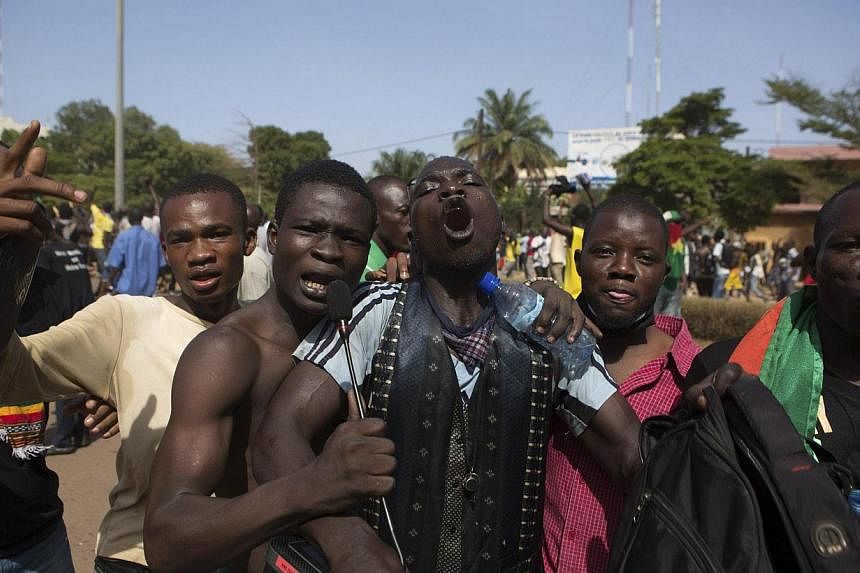THE military in the West African nation of Burkina Faso seized power on Oct 31, 2014, after several days of violent protests demanding the removal of President Blaise Compaore. Here is what you should know about Burkina Faso and the situation there:
Where is Burkina Faso?
Burkina Faso, a former French colony, is a landlocked country in West Africa. It is bordered by Mali to the north, Niger to the east, Benin to the south-east, Togo and Ghana to the south and Ivory Coast to the south-west. Its population is more than 17 million, making it the 19th most populous country in Africa. It is the fourth-largest gold producer in Africa and is home to several international mining firms including TrueGold, IamGold and Randgold Resources.
Why is it important?
Burkina Faso is important for several reasons. Because of the country's geographical position, Mr Compaore has long fulfilled an important role as mediator in West African conflicts such as in the Ivory Coast and Mali. More recently, he has been important as mediator in the battle against Islamic extremism in Northern and Western Africa.
Furthermore, France uses Burkina Faso as a launchpad for its Special Forces mission in the Sahel-Sahara region against Al-Qaeda-linked fighters. The United States also has a base in the capital Ouagadougou that operates as a hub for a US spying network in the region, with planes departing from the base to fly over Mali, Mauritania and the Sahara, tracking fighters from the Al-Qaeda in the Islamic Maghreb.
A report by the International Crisis Group (ICG) stated that: "A crisis in Burkina Faso would not only mean the loss of a key ally and a strategic base for France and the United States, it would also reduce the capacity of an African country in dealing with regional conflicts."
France has urged restraint in Burkina Faso, while the White House has condemned the violence. The European and African Union as well as the United Nations have also called for an end to the violence.
What triggered the unrest?
The trigger for the unrest was Mr Campaore's attempt to rewrite the constitution to allow himself to seek re-election next year. As the vote was due to take place, thousands of people stormed the parliament on Thursday (Oct 30, 2014). They set the building ablaze, looted government offices and burst the headquarters of state television in the capital Ouagadougou. Soldiers opened fire with live rounds but failed to disperse the crowds. Mr Campaore declared a state of emergency before lifting it hours later.
The army, in what it said was a bid to restore order and save lives, seized control of the government and set a dusk-to-dawn curfew. The head of the armed forces, General Honore Traore, dissolved parliament and announced talks with all political parties to create an interim government to take the West African country to democratic elections within a year.
The opposition insisted that Mr Campaore stepped down but he refused, and instead urged for calm and withdrew the proposed constitutional amendment. He also said he would stay in power at the head of a transitional government until after elections.
Who is Blaise Compaore?
Mr Compaore is one of Africa's longest-serving presidents. He has served two seven-year terms before a change to the constitution allowed him to serve another two five-year terms.
He was 36 years old when he seized power on Oct 15, 1987, in a coup in which Thomas Sankara, his former friend and one of Africa's most revered leaders, was ousted and assassinated. Now 63, Mr Compaore is a staunch ally of the US and France, but was also notoriously close to former Libyan leader Muammar Gaddafi and ex-Liberian president Charles Taylor, found guilty of aiding and abetting crimes against humanity.
Diplomatic pressure had mounted over the past year for Compaore to step down in 2015, amid calls from his own entourage for him to seek re-election, diplomats said.
A letter from French President Francois Hollande to Mr Compaore earlier this month, seen by Reuters, offered France's support in finding him a job with an international organisation. Diplomats, however, say Mr Compaore has been concerned about the possibility of losing his immunity from prosecution, particularly in the wake of the trial of the former Liberian leader in the Hague.
SOURCE: CNN. BBC, GUARDIAN, AFP, REUTERS

